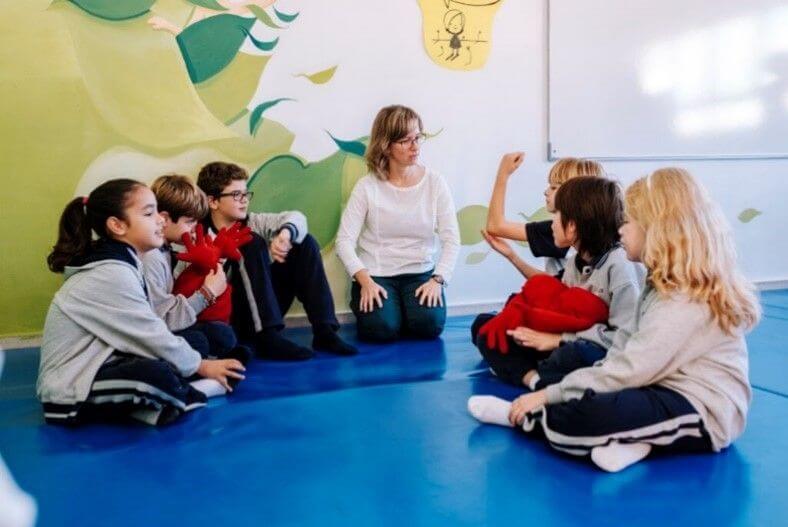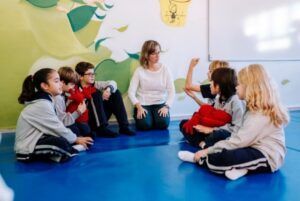How to work on emotions in primary school in educational environments
Emotional education at Early Years ages is part of basic education. Knowing how to work on emotions in primary school will allow us to reinforce the student’s emotional competences, promoting values such as empathy, solidarity or leadership.
What is emotional education?
Emotional education is a set of pedagogical techniques related to the management of emotional competences. What we seek is to offer tools aimed at increasing social and personal well-being from a psychological point of view.
Emotions have a decisive influence in our daily life and a good emotional management is a basic aptitude for any person. E motional education in primary school focuses on the management of emotions from an early age, trying to offer solutions in social situations as well as in personal circumstances.
It is recommended that a child begins to effectively manage their emotions from an early age. It is important in schools to promote activities that help support and develop emotions in environments that are safe and secure. During these key years the student will have the first contact with a series of emotional responses that will be very useful for them in the future.
In which areas do we work on emotional competences
The pedagogical programs focused on the emotional area distinguish 5 different areas, in which the student puts into practice different emotional responses.
- Emotional awareness: This is a basic competence focused on the recognition of one’s own and other people’s emotions. Assertiveness and empathy are two of the values we work on through emotional awareness.
- Emotional regulation: In this case we work on the emotional responses we may have in different circumstances, focusing on how we adapt our emotions to each situation.
- Emotional autonomy: Emotional autonomy tries to achieve a balance, preventing external circumstances from affecting us more than they should, but encouraging empathy in the face of external emotions.
- Social competence: We seek that the student develops a series of interpersonal skills that favour their relationship with other people, especially from the emotional level.
- Practical skills: The programs of emotional education in primary school have sections especially oriented to the implementation of the emotional skills that each student has acquired.
Is it really important to work on a student’s emotional skills?
Yes, especially during the primary school years. When we talk about basic education, we usually refer to a set of academic knowledge, however, during the first years of schooling we must also focus on other aspects that will be decisive for the student.
Emotion management is a basic ability in adults, working on emotions in primary school will allow the student to develop valid emotional responses, which will be the ones that will allow him or her to enjoy emotional well-being in the future.
The techniques that focus on how to work on emotions in primary school facilitate the understanding by the student, and also focus on the practical part of emotional teaching. The long-term consequences have to do especially with the student’s ability to offer appropriate emotional responses, which have a positive impact on both the person and his or her environment.
Socialization as a basic emotional technique
Socialization is the set of emotional techniques oriented to interpersonal relationships. Much of our emotional balance is given by our relationships with others, through socialization techniques we encourage values such as solidarity, companionship or friendship, fundamental throughout his or her life
Working on the emotional level of the student means sharing, the primary school years represent the most appropriate time for the student to begin to associate certain behaviors with their emotional well-being, on the contrary, if during these years certain social behaviors are not worked on, the student may develop a series of emotional deficiencies that will be reflected in adulthood.
Educational programs focused on emotional development include different exercises oriented to interpersonal relationships and their impact on emotions. In this sense, the concept of empathy is fundamental. Empathy is the ability to put oneself in the place of another person, if a student learns to be empathetic at an early age, he or she will be able to develop a series of basic social skills for later relationships with others.
The management of personal emotions
Beyond the emotional values focused on others, it is important that the student knows how to manage certain circumstances in a personal way. Emotions have a basic influence on a person’s wellbeing, and we can help our students to generate valid emotional responses, capable of reinforcing their own wellbeing.
In general terms, the objective is to provide confidence to the student. In the short term we stimulate their security when facing all kinds of tasks, both inside and outside the classroom. In the long term we are encouraging the necessary confidence to carry out a vital project, something which is very important for us.
How to work on emotions in primary school
The usual process for working on emotions during the primary school years focuses on practical activities, which act as metaphors for real situations. What we are looking for are specific activities, capable of generating an affective response that can be put into practice in real life.
It is important to reinforce social values, depending on the emotional responses that each student can generate in certain situations. Emotional teaching in primary school also has a specific task with respect to bullying, through these practices we get a child who suffers bullying to develop an appropriate attitude, like the rest of the students, also discouraging any behaviour related to bullying in the classroom.
The activities focused on the emotional aspect of the student do not seek to mask certain behaviors, on the contrary, it is important that the student knows the different emotional responses that exist and how to manage them. If this teaching process is correct, we will be offering our students the emotional tools that they will need throughout their lives, both in personal circumstances and in situations in which we must relate to other people.
ISP Schools is a network of 11 private schools in Spain, specialists in British and international education, and part of the International Schools Partnership, one of the largest educational groups in the world, with 50 schools and 45,000 students in 15 countries. We train bilingual students, help them reach their full academic potential, and empower them to adopt an international mindset through innovative learning.
Under this premise, our educational experts have prepared this content as part of the “ISP EDUCATION TALKS” initiative, an useful resource for obtaining information and advice on key issues for the education of our children.



























